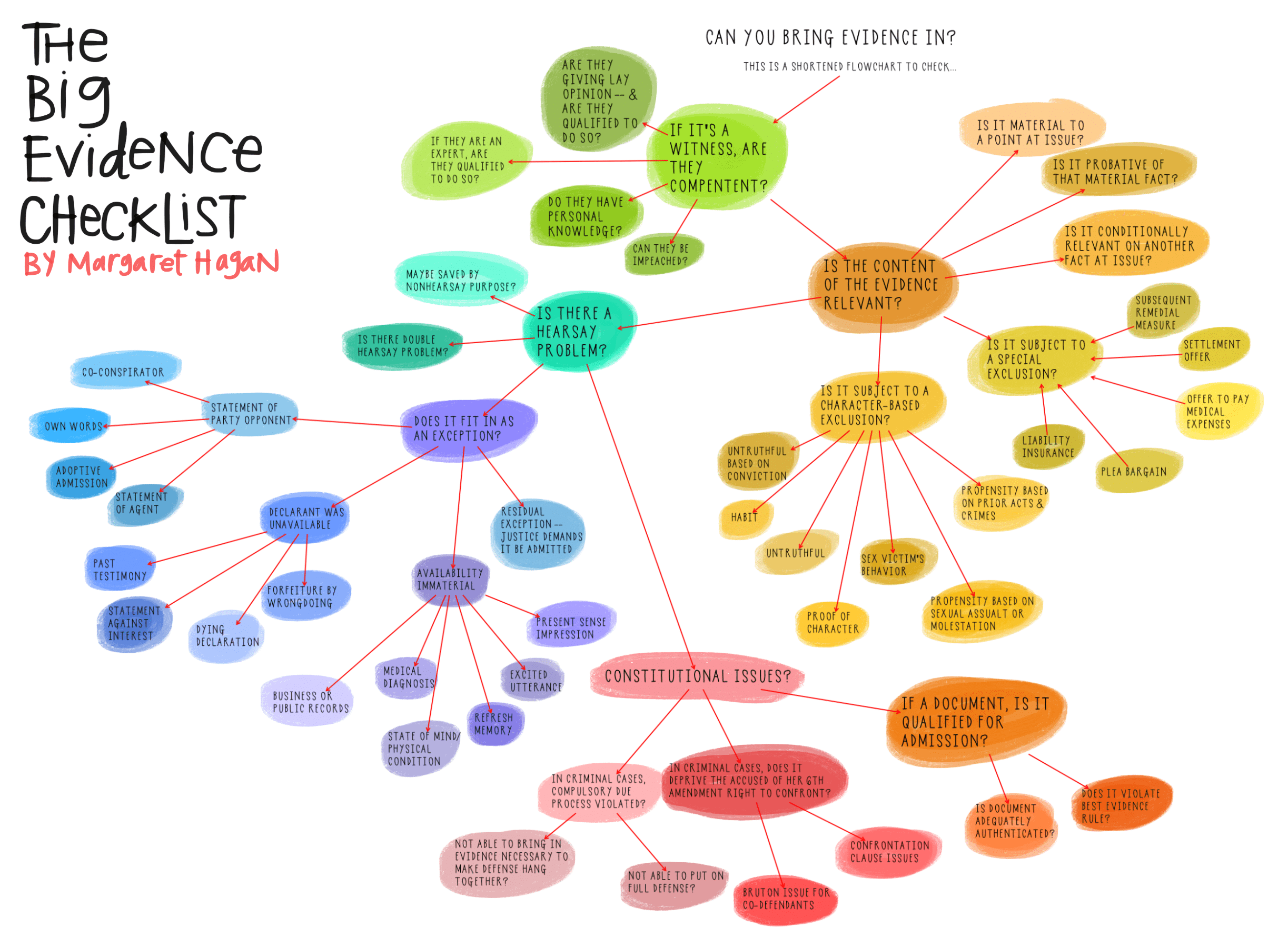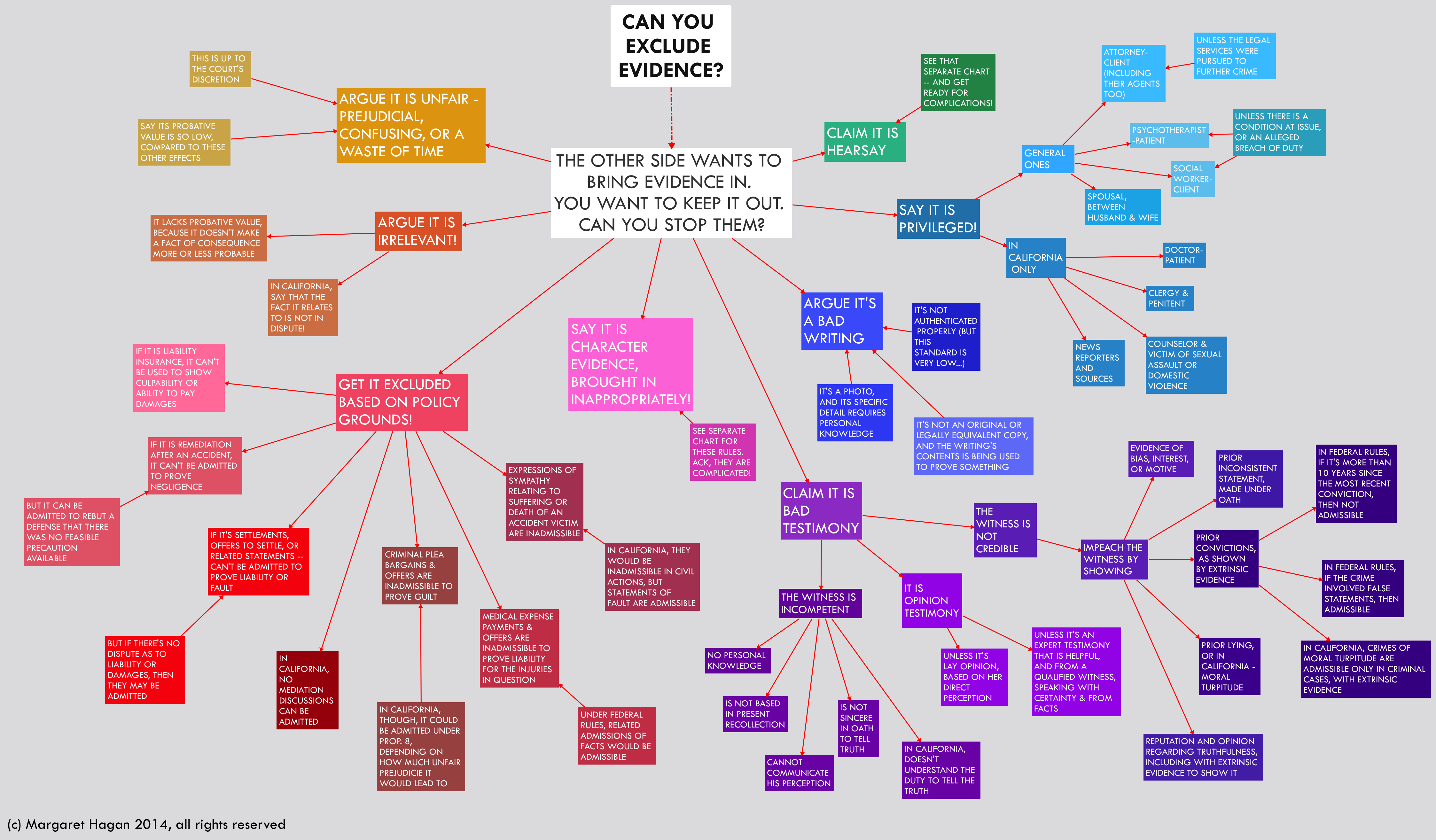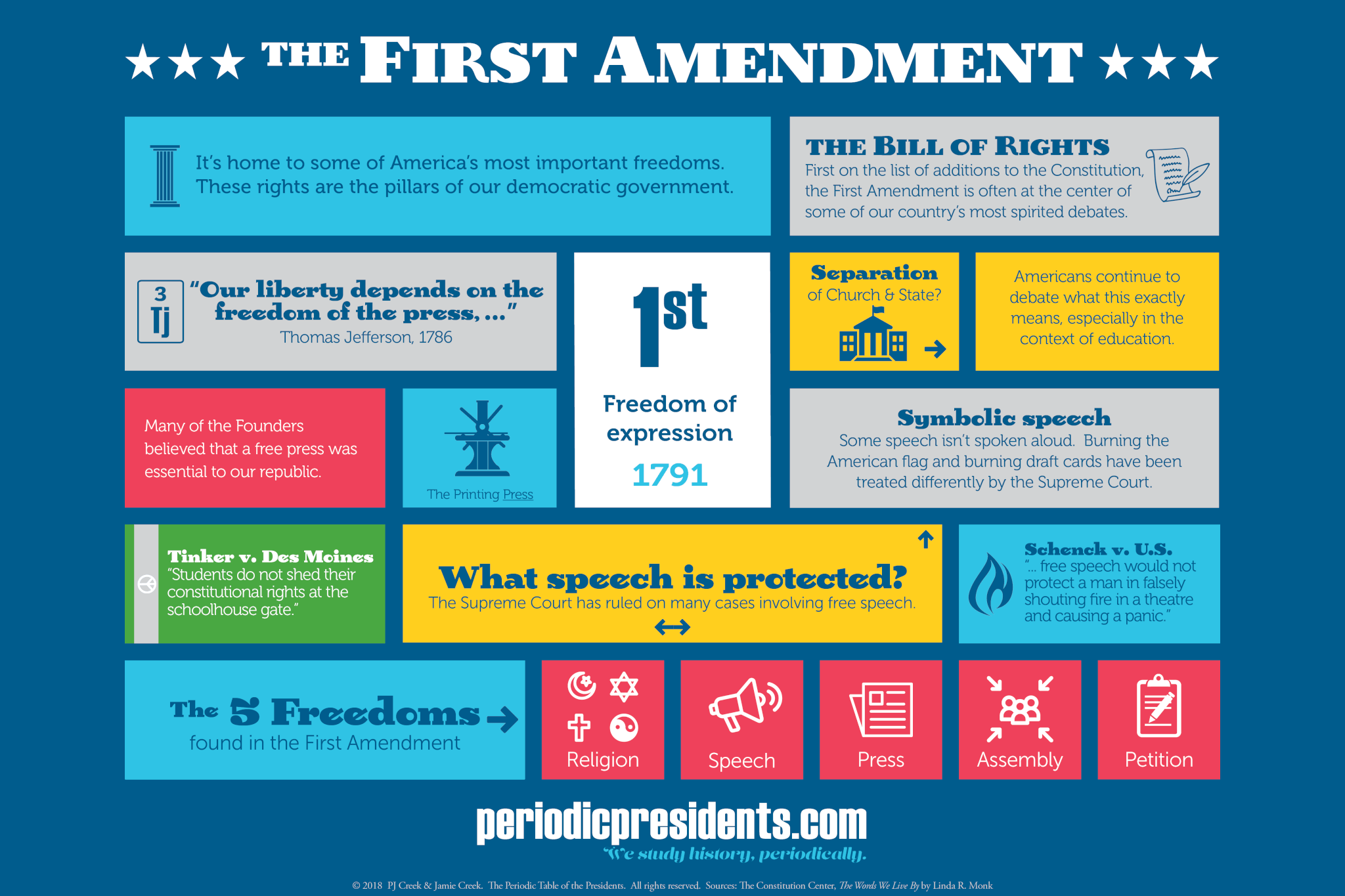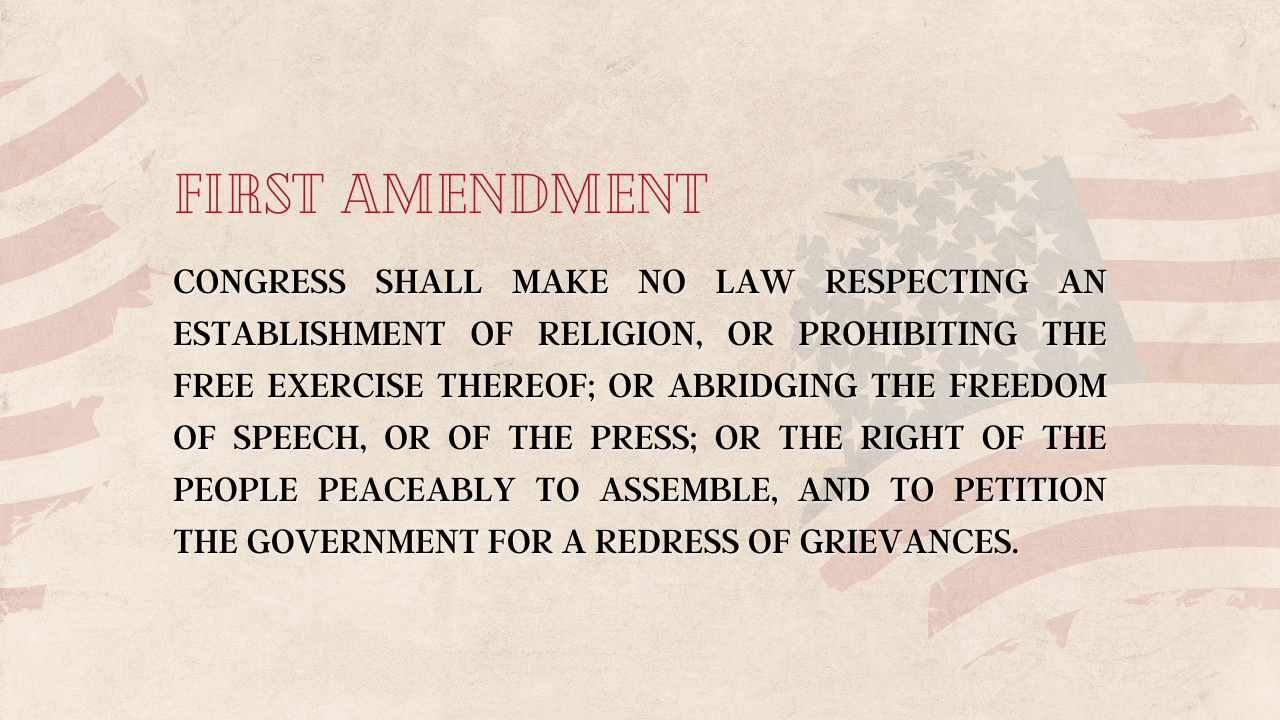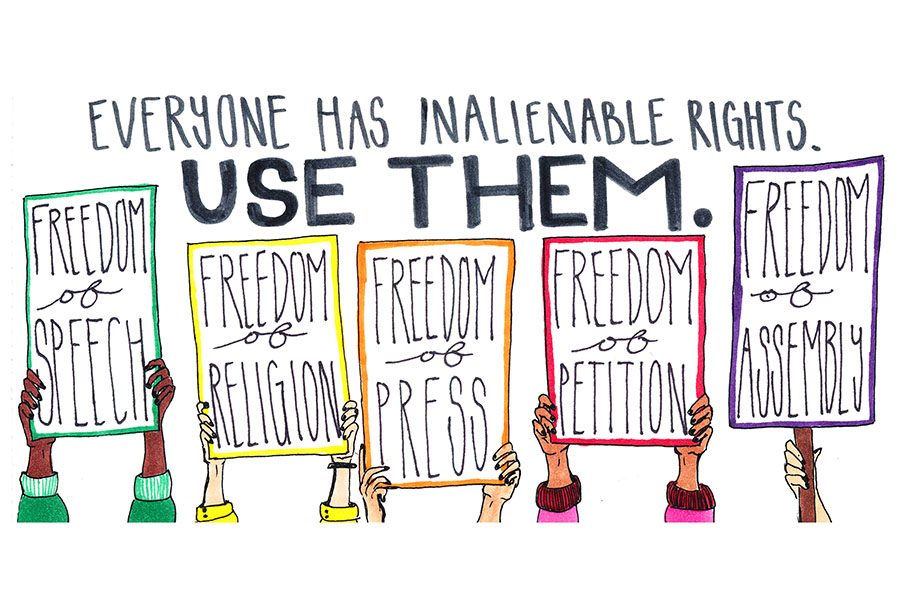The First Amendment – Amendment I
The First Amendment provides that Congress make no law respecting an establishment of religion or prohibiting its free exercise. It protects freedom of speech, the press, assembly, and the right to petition the Government for a redress of grievances.
First Amendment
Congress shall make no law respecting an establishment of religion, or prohibiting the free exercise thereof; or abridging the freedom of speech, or of the press; or the right of the people peaceably to assemble, and to petition the Government for a redress of grievances.
Read directly from the governement if you need to here First Amendment
Can You Annoy the Government? click to learn mope
U.S. Supreme Court
- Miller v. US, 230 F 486 at 489 The claim and exercise of a Constitutional right cannot be converted into a crime.
- Norton v. Shelby County, 118 US 178 (1886) An unconstitutional “law ” is not a law; it confers no rights, imposes no duties, and affords no protection.
- Chief Justice John Marshall Marbury v. Madison, 5 US (1Cranch) 137, 174, 176 (1803) All laws which are repugnant to the Constitution are null and void. Marbury v. Madison, 5 U.S. (1 Cranch) 137 (1803), was a landmark U.S. Supreme Court case that established the principle of judicial review in the United States, meaning that American courts have the power to strike down laws and statutes that they find to violate the Constitution of the United States
- State v. Sutton, 63 Min 147, 65 NW 262, 30 LRA630, AM ST 459 When any court violates the clean and unambiguous language of the Constitution, a fraud is perpetuated, and no one is bound to obey it.
- Norton vs. Shelby County, 118 US 425 p. 442. “An unconstitutional act is not law; it confers no rights; it imposes no duties; affords no protection; it creates no office; it is in legal contemplation, as inoperative as though it had never been passed.”
- Bell v. Hood, 71 F.Supp., 813, 816 (1947) U.S.D.C. — So. Dist. CA. History is clear that the first ten amendments to the Constitution were adopted to secure certain common law rights of the people, against invasion by the Federal Government.”
- SIMMONS v US, supra. “We find it intolerable that one constitutional right should have to be surrendered in order to assert another”
- Sable Communications of California v. Federal Communications Commission (1989)
When Congress acted to restrict this growing industry, Sable Communications filed suit in federal district court seeking an injunction against enforcement of the obscene and indecent portions of Section 223(b). The district court denied the injunction, upheld the obscenity portion, and struck down the indecency section of Section 223(b). - United States Supreme Court Rosenfeld v. New Jersey (1972) it is well understood that the right of free speech is not absolute at all times and under all circumstances. overly broad and violative of the First Amendment” State v. Rosenfeld 62 N.J. 594 (1973) 303 A.2d 889
- Miranda vs Arizona, 384 U.S. 436 p. 491 “Where rights secured by the Constitution are involved, there can be no rule making or legislation which would abrogate them.”
- Cohen v. California (1971) 403 U.S. 15 (1971), The Supreme Court established that the government generally cannot criminalize the display of profane words in public places. The Court rejected a fighting words application to a young man who wore a leather jacket with the words “fuck the draft” on it in a public courthouse.
Held: Absent a more particularized and compelling reason for its actions, the State may not, consistently with the First and Fourteenth Amendments, make the simple public display of this single four-letter expletive a criminal offense. Pp. 403 U. S. 22-26. Cohen v. California, 403 U.S. 15 (1971)1 Cal. App. 3d 94, 81 Cal. Rptr. 503, reversed.
HARLAN, J., delivered the opinion of the Court, in which DOUGLAS, BRENNAN, STEWART, and MARSHALL, JJ., joined. BLACKMUN, J., filed a dissenting opinion, in which BURGER, C.J., and BLACK, J., joined, and in which WHITE, J., joined in part, post, p. 403 U. S. 27.
- People v. Boomer (Mich. Ct. App.) (2002) “Allowing a prosecution where one utters ‘insulting’ language could possibly subject a vast percentage of the populace to a misdemeanor conviction,”
- A.V v St Paul 1992 Justices ruled as unconstitutional a St. Paul ordinance classifying as hate speechwords “that insult, or provoke violence, ‘on the basis of race, color, creed, religion or gender.’ ”
- Karlan v. City of Cincinnati (1974) Police officers should not be considered “fighting words,” because police officers are trained to exercise a higher degree of constraint than the average citizen.
- Reno v. American Civil Liberties Union (1997)
speech on the Internetis entitled to the same high degree of First Amendment protection extended to the print media as opposed to the reduced level given the broadcast media. - Bible Believers v. Wayne County (6th Cir.) (2015)
The case stands for the principle that the First Amendment protects unpopular speech and that government officials should not sanction a heckler’s veto. - Albert Krantz v. City of Fort Smith
A 1998 decision by the Eighth Circuit Court of Appeals concerning the distribution and posting of flyers and leaflets. In this ruling informed by the First Amendment’s protection of freedom of expression. - Lucas v. Arkansas (1974)416 U.S. 919 (1974)
The single-sentence Supreme Court decision in Lucas v. Arkansas, 416 U.S. 919 (1974), vacated and remanded this case, along with Kelly v. Ohio, Rosen v. California, and Karlan v. City of Cincinnati, to a state court for further consideration in light of the Court’s opinion in Lewis v. City of New Orleans (1974). Court remanded convictions after saying ordinance prohibiting fighting words violated First Amendment - Uzuegbunam v. Preczewski (2021) authorities asked him to stop on the basis that others had complained and that the college prohibited any such speech that “disturbs the peace and/or comfort of person(s).”
- Lewis v. City of New Orleans (1974) The U.S. Supreme Court in 1974 overturned a woman’s conviction for cursing at police. Lewis had overturned a New Orleans ordinance on the basis that it violated the First and Fourteenth Amendments by being overbroad in its attempt to prohibit vulgar and offensive speech and “fighting words,” as recognized in Chaplinsky v. New Hampshire (1942) and Gooding v. Wilson (1972).
- City of Houston v. Hill (1987) In City of Houston v. Hill, 482 U.S. 451 (1987), the Supreme Court found a city ordinance prohibiting verbal abuse of police officers to be unconstitutionally overbroad and a criminalization of protected speech.
- STATE of Nebraska, appellee, v. Darren J. DRAHOTA – Darren Drahota sent a couple of anonymous insulting emails to William Avery, Drahota’s former political science professor, who was running for the Nebraska Legislature at the time. (Avery was eventually elected and served two terms.) Drahota was convicted of disturbing the peace for sending those emails, but the conviction was reversed in 2010 by the Nebraska Supreme Court. (I have a soft spot in my heart for this case, because it was the first First Amendment case I ever argued in court.)
- STATE of Iowa, Appellee, v. William James FRATZKE, Appellant – William Fratzke was convicted of harassment “because he wrote a nasty letter to a state highway patrolman to protest a speeding ticket.” The Iowa Supreme Court (1989) reversed, on First Amendment grounds.
- State of Wisconsin v. Thomas G. Smith – Thomas Smith was convicted of disorderly conduct and “unlawful use of a computerized communication system” for leaving two vulgar, insulting comments on a police department’s Facebook page. A one-judge Wisconsin Court of Appeals decision (2014) reversed. (Note that such insults aren’t unprotected “fighting words” because they aren’t face-to-face and thus aren’t likely to lead to an immediate fight.)
- Commonwealth v. Bigelow – Harvey Bigelow sent two letters to Michael Costello, an elected town council member; both were insulting, and one was vulgar. Bigelow was convicted of criminal harassment, but the Massachusetts high court (2016) reversed: “Because these letters were directed at an elected political official and primarily discuss issues of public concern — Michael’s qualifications for and performance as a selectman — the letters fall within the category of constitutionally protected political speech at the core of the First Amendment.” And this was true even though the letters were sent to him at home. the case law link was above, but you can actually read the newspaper article of his exact doings here
- People v. Powers, (2011) 193 Cal.App.4th 158,166. (“We conclude that the recordings appellant left on the customer service line cannot constitute substantial evidence that appellant violated section 653m, subdivision (a) [California’s annoying phone calls law]. The messages are annoying rants concerning customer service. It is reasonable for someone to be annoyed by appellant’s language. But the vulgarities uttered cannot be described as obscene, especially in the context of a customer service line maintained to take complaints. Except in extreme cases, we doubt that a person whose job it is to receive consumer complaints has a right to privacy against unwanted intrusion.”) THE PEOPLE, v. DAVID THOMAS POWERS determined although they may be a little annoying they were NOT ILLEGAL!
-
Lozman v. City of Riviera Beach Supreme Court considers free speech vs. retaliatory arrests
- Ion Popa left seven messages containing racist insults on the answering machine of the head federal prosecutor in D.C. — Eric Holder, who eventually became attorney general. He was convicted of telephone harassment, which banned all anonymous calls made “with intent to annoy, abuse, threaten, or harass.”
But the D.C. Circuit (1989) expressly held that the First Amendment prevented the statute from applying to “public or political discourse,” such as condemnation of political officials (even left expressly for that official).
Right to Record Government Officials Engaged in the Exercise of their Official Duties
Watch this different display of US RIGHTS in a JERSEY OFFICIAL MEETING by ANGRY CONSTITUTIONALIST https://www.youtube.com/watch?v=0wUH7GJjlYQ
It doesn’t look like our constitutional right of freedom of the press is going away any time soon.
FLYER & NEWS WEBSITE LAW
Flyers Handbills/ Leaflets - US constitutional rights, Freedom of Speech & Press There shall be no Law passed to abridge or restrain freedom of speech or the press. Freedom of speech encompasses all manner of expression, both verbal and non-verbal
FREEDOM OF THE PRESS DEFINITION
The freedom of communication and expression through media and/or published material. Flyers are communication and expression through published media material.
HANDBILL DEFINITION
A single page leaflet advertising events, services or other activities. Flyers are typically used by individuals or business’ to promote their product or services. They are a form of mass marketing or small scale community communication. Information News Flyers are a legal form of community communication handbills by definition. A Website is a Digital Handbill of leaflet, it is the digital form of handing them out, how else could one get a peacefully assembly organized in todays society 2022
LITTER DEFINITION
Litter consists of waste products. Information News Flyers (same as LA Times or LA Weekly or other Leaflet Information/News) are not waste products or litter by legal definition and to claim or mislead holds no water to the law. Flyers are not trash by legal definition and to mislead and claim they are would hold no water to the law.
TRASH DEFINITION
Unwanted or undesired waste material.
The freedom of communication and expression through media and/or published material. Flyers are communication and expression through published or printed media material.
FLYERS/LEAFLETS/HANDBILLS/ = MODERN DAY WEBPAGE
TODAY WE USE SOCIAL MEDIA OR WEBPAGES TO CATCH EYEBALLS ATTENTION TO OUR CAUSE, THE BEHAVIOR IS THE MODERN DIGITAL FORM OF LEAFLETS
an in-depth article can be found below regarding
Freedom of the Religion, Speech & Press – Flyers, Newspaper, Leaflets, Peaceful Assembly
Freedom of the Press – Flyers, Newspaper, Leaflets, Peaceful Assembly – 1st Amendment
What Does An Asian American Band Called THE SLANTS Have To Do With Telling Police FUCK YOU?
To Learn More…. Read MORE Below and click the links Below
Abuse & Neglect – The Mandated Reporters (Police, D.A & Medical & the Bad Actors)
Mandated Reporter Laws – Nurses, District Attorney’s, and Police should listen up
If You Would Like to Learn More About: The California Mandated Reporting LawClick Here
To Read the Penal Code § 11164-11166 – Child Abuse or Neglect Reporting Act – California Penal Code 11164-11166Article 2.5. (CANRA) Click Here
Mandated Reporter formMandated ReporterFORM SS 8572.pdf – The Child Abuse
ALL POLICE CHIEFS, SHERIFFS AND COUNTY WELFARE DEPARTMENTS INFO BULLETIN:
Click Here Officers and DA’s for (Procedure to Follow)
It Only Takes a Minute to Make a Difference in the Life of a Child learn more below
You can learn more here California Child Abuse and Neglect Reporting Law its a PDF file
Learn More About Police, The Government Officials and You….
$$ Retaliatory Arrests and Prosecution $$
Anti-SLAPP Law in California
Freedom of Assembly – Peaceful Assembly – 1st Amendment Right
Supreme Court sets higher bar for prosecuting threats under First Amendment 2023 SCOTUS
We also have the Brayshaw v. City of Tallahassee – 1st Amendment – Posting Police Address
We also have the Publius v. Boyer-Vine –1st Amendment – Posting Police Address
We also have the Lozman v. City of Riviera Beach, Florida (2018) – 1st Amendment – Retaliatory Police Arrests
We also have the Nieves v. Bartlett (2019) – 1st Amendment – Retaliatory Police Arrests
We also have the Hartman v. Moore (2006) – 1st Amendment – Retaliatory Police Arrests
Retaliatory Prosecution Claims Against Government Officials – 1st Amendment
We also have the Reichle v. Howards (2012) – 1st Amendment – Retaliatory Police Arrests
Retaliatory Prosecution Claims Against Government Officials – 1st Amendment
Can You Annoy the Government? – 1st Amendment
Freedom of the Press – Flyers, Newspaper, Leaflets, Peaceful Assembly – 1$t Amendment – Learn More Here
Vermont’s Top Court Weighs: Are KKK Fliers – 1st Amendment Protected Speech
We also have the Insulting letters to politician’s home are constitutionally protected, unless they are ‘true threats’ – Letters to Politicians Homes – 1st Amendment
We also have the First Amendment Encyclopedia very comprehensive – 1st Amendment
Paglia & Associates Construction v. Hamilton – Public Internet Posts & Public Criticisms – Bad Reviews – 1st Amendment
Right to Record Government Officials Engaged in the Exercise of their Official Duties
Learn More About True Threats Here below….
Counterman v. Colorado – Supreme Court sets higher bar for prosecuting threats under First Amendment
We also have the The Brandenburg v. Ohio (1969) – 1st Amendment
CURRENT TEST = We also have the The ‘Brandenburg test’ for incitement to violence – 1st Amendment
We also have the The Incitement to Imminent Lawless Action Test– 1st Amendment
We also have the True Threats – Virginia v. Black is most comprehensive Supreme Court definition – 1st Amendment
We also have the Watts v. United States – True Threat Test – 1st Amendment
We also have the Clear and Present Danger Test – 1st Amendment
We also have the Gravity of the Evil Test – 1st Amendment
We also have the Elonis v. United States (2015) – Threats – 1st Amendment
Learn More About What is Obscene…. be careful about education it may enlighten you
We also have the Miller v. California – 3 Prong Obscenity Test (Miller Test) – 1st Amendment
We also have the Obscenity and Pornography – 1st Amendment
Mi$Conduct – Pro$ecutorial Mi$Conduct Prosecutor$
Attorney Rule$ of Engagement – Government (A.K.A. THE PRO$UCTOR) and Public/Private Attorney
What is a Fiduciary Duty; Breach of Fiduciary Duty
The Attorney’s Sworn Oath
Malicious Prosecution / Prosecutorial Misconduct – Know What it is!
New Supreme Court Ruling – makes it easier to sue police
Possible courses of action Prosecutorial Misconduct
Misconduct by Judges & Prosecutor – Rules of Professional Conduct
Functions and Duties of the Prosecutor – Prosecution Conduct
Standards on Prosecutorial Investigations – Prosecutorial Investigations
Information On Prosecutorial Discretion
Why Judges, District Attorneys or Attorneys Must Sometimes Recuse Themselves
Fighting Discovery Abuse in Litigation – Forensic & Investigative Accounting – Click Here
Criminal Motions § 1:9 – Motion for Recusal of Prosecutor
Pen. Code, § 1424 – Recusal of Prosecutor
Removing Corrupt Judges, Prosecutors, Jurors and other Individuals & Fake Evidence from Your Case
National District Attorneys Association puts out its standards
National Prosecution Standards – NDD can be found here
The Ethical Obligations of Prosecutors in Cases Involving Postconviction Claims of Innocence
ABA – Functions and Duties of the Prosecutor – Prosecution Conduct
Prosecutor’s Duty Duty to Disclose Exculpatory Evidence Fordham Law Review PDF
Chapter 14 Disclosure of Exculpatory and Impeachment Information PDF
Mi$Conduct – Judicial Mi$Conduct Judge$
Prosecution Of Judges For Corrupt Practice$
Code of Conduct for United States Judge$
Disqualification of a Judge for Prejudice
Judicial Immunity from Civil and Criminal Liability
Recusal of Judge – CCP § 170.1 – Removal a Judge – How to Remove a Judge
l292 Disqualification of Judicial Officer – C.C.P. 170.6 Form
How to File a Complaint Against a Judge in California?
Commission on Judicial Performance – Judge Complaint Online Form
Why Judges, District Attorneys or Attorneys Must Sometimes Recuse Themselves
Removing Corrupt Judges, Prosecutors, Jurors and other Individuals & Fake Evidence from Your Case
DUE PROCESS READS>>>>>>
Due Process vs Substantive Due Process learn more HERE
Understanding Due Process – This clause caused over 200 overturns in just DNA alone Click Here
Mathews v. Eldridge – Due Process – 5th, & 14th Amendment
Mathews Test – 3 Part Test– Amdt5.4.5.4.2 Mathews Test
“Unfriending” Evidence – 5th Amendment
At the Intersection of Technology and Law
We also have the Introducing TEXT & EMAIL Digital Evidence in California Courts – 1st Amendment
so if you are interested in learning about Introducing Digital Evidence in California State Courts
click here for SCOTUS rulings
Right to Travel freely – When the Government Obstructs Your Movement – 14th Amendment & 5th Amendment
What is Probable Cause? and.. How is Probable Cause Established?
Misuse of the Warrant System – California Penal Code § 170 – Crimes Against Public Justice – 4th, 5th, & 14th Amendment
What Is Traversing a Warrant (a Franks Motion)?
Dwayne Furlow v. Jon Belmar – Police Warrant – Immunity Fail – 4th, 5th, & 14th Amendment
Obstruction of Justice and Abuse of Process
What Is Considered Obstruction of Justice in California?
ARE PEOPLE LYING ON YOU?
CAN YOU PROVE IT? IF YES…. THEN YOU ARE IN LUCK!
Penal Code 115 PC – Filing a False Document in California
Penal Code 118 PC – California Penalty of “Perjury” Law
Federal Perjury – Definition by Law
Penal Code 132 PC – Offering False Evidence
Penal Code 134 PC – Preparing False Evidence
Crimes Against Public Justice
Penal Code 118.1 PC – Police Officer$ Filing False Report$
Spencer v. Peters– Police Fabrication of Evidence – 14th Amendment
Lying Cop or Citizen – PC 129 – Preparing False Statement or Report Under Oath
Penal Code 132 PC – Offering False Evidence
Penal Code 134 PC – Preparing False Evidence
Penal Code 135 PC – Destroying or Concealing Evidence
Lying Cop or Citizen – PC 129 – Preparing False Statement or Report Under Oath
Penal Code 141 PC – Planting or Tampering with Evidence in California
Penal Code 142 PC – Peace Officer Refusing to Arrest or Receive Person Charged with Criminal Offense
PC 146 Penal Code – False Arrest
Penal Code 148.5 PC – Making a False Police Report in California
Misuse of the Warrant System – California Penal Code § 170
Penal Code 182 PC – “Criminal Conspiracy” Laws & Penalties
Penal Code § 236 PC – False Imprisonment
Penal Code 664 PC – “Attempted Crimes” in California
Penal Code 31 PC – Aiding and Abetting Laws
Penal Code 32 PC – Accessory After the Fact
What is Abuse of Process?
What is a Due Process Violation? – 4th Amendment & 14th Amendment
What’s the Difference between Abuse of Process, Malicious Prosecution and False Arrest?
Defeating Extortion and Abuse of Process in All Their Ugly Disguises
The Use and Abuse of Power by Prosecutors (Justice for All)
Misconduct by Government Know Your Rights Click Here
Under 42 U.S.C. $ection 1983 – Recoverable Damage$
42 U.S. Code § 1983 – Civil Action for Deprivation of Right$
18 U.S. Code § 242 – Deprivation of Right$ Under Color of Law
18 U.S. Code § 241 – Conspiracy against Right$
Section 1983 Lawsuit – How to Bring a Civil Rights Claim
Suing for Misconduct – Know More of Your Right$
Police Misconduct in California – How to Bring a Lawsuit
How to File a complaint of Police Misconduct? (Tort Claim Forms here as well)
Deprivation of Rights – Under Color of the Law
What is Sua Sponte and How is it Used in a California Court?
Removing Corrupt Judges, Prosecutors, Jurors
and other Individuals & Fake Evidence from Your Case
Anti-SLAPP Law in California
Freedom of Assembly – Peaceful Assembly – 1st Amendment Right
How to Recover “Punitive Damages” in a California Personal Injury Case
Pro Se Forms and Forms Information(Tort Claim Forms here as well)
What is Tort?
Tort Claims Form
File Government Claim for Eligible Compensation
Complete and submit the Government Claim Form, including the required $25 filing fee or Fee Waiver Request, and supporting documents, to the GCP.
See Information Guides and Resources below for more information.
Tort Claims – Claim for Damage, Injury, or Death (see below)
Federal – Federal SF-95 Tort Claim Form Tort Claim online here or download it here or here from us
California – California Tort Claims Act – California Tort Claim Form Here or here from us
Complaint for Violation of Civil Rights (Non-Prisoner Complaint) and also UNITED STATES DISTRICT COURT PDF
Taken from the UNITED STATES DISTRICT COURT FOR THE EASTERN DISTRICT OF CALIFORNIA Forms source
WRITS and WRIT Types in the United States
How do I submit a request for information?
To submit a request send the request via mail, fax, or email to the agency. Some agencies list specific departments or people whose job it is to respond to PRA requests, so check their websites or call them for further info. Always keep a copy of your request so that you can show what you submitted and when.
Templates for Sample Requests
Incident Based Request: Use this template if you want records related to a particular incident, like the investigative record for a specific police shooting, an arrest where you believe an officer may have been found to have filed a false report, or to find out whether complaint that an officer committed sexual assault was sustained.
ACLU Download Word document | ACLU Download PDF
or from us Download Word document | or from us Download PDF
Officer Based Request: Use this template if you want to find any public records of misconduct related to a particular officer or if he or she has been involved in past serious uses of force.
ACLU Download Word document | ACLU Download PDF
or from us Download Word document | or from us Download PDF
The First Amendment Coalition also has some useful information to help explain the PRA process.
Sample Letter | SB 1421 & SB 16 Records
Appealing/Contesting Case/Order/Judgment/Charge/ Suppressing Evidence
First Things First: What Can Be Appealed and What it Takes to Get Started – Click Here
Options to Appealing– Fighting A Judgment Without Filing An Appeal Settlement Or Mediation
Cal. Code Civ. Proc. § 1008 Motion to Reconsider
Penal Code 1385 – Dismissal of the Action for Want of Prosecution or Otherwise
Penal Code 1538.5 – Motion To Suppress Evidence in a California Criminal Case
CACI No. 1501 – Wrongful Use of Civil Proceedings
Penal Code “995 Motions” in California – Motion to Dismiss
WIC § 700.1 – If Court Grants Motion to Suppress as Evidence
Suppression Of Exculpatory Evidence / Presentation Of False Or Misleading Evidence – Click Here
Notice of Appeal — Felony (Defendant) (CR-120) 1237, 1237.5, 1538.5(m) – Click Here
California Motions in Limine – What is a Motion in Limine?
Petition for a Writ of Mandate or Writ of Mandamus (learn more…)
PC 1385 – Dismissal of the Action for Want of Prosecution or Otherwise
Retrieving Evidence / Internal Investigation Case
Pitchess Motion & the Public Inspection of Police Records
Conviction Integrity Unit (“CIU”) of the Orange County District Attorney OCDA – Click Here
Fighting Discovery Abuse in Litigation – Forensic & Investigative Accounting – Click Here
Orange County / LA County Data, BodyCam, Police Report, Incident Reports,
and all other available known requests for data below:
SEARCH SB-1421 SB-16 Incidents of LA County, Oakland
California Senate Bill 16 (SB 16) – 2023-2024 – Peace officers: Release of Records
APPLICATION TO EXAMINE LOCAL ARREST RECORD UNDER CPC 13321 Click Here
Learn About Policy 814: Discovery Requests OCDA Office – Click Here
Request for Proof In-Custody Form Click Here
Request for Clearance Letter Form Click Here
Application to Obtain Copy of State Summary of Criminal HistoryForm Click Here
Request Authorization Form Release of Case Information – Click Here
Texts / Emails AS EVIDENCE: Authenticating Texts for California Courts
Can I Use Text Messages in My California Divorce?
Two-Steps And Voila: How To Authenticate Text Messages
How Your Texts Can Be Used As Evidence?
California Supreme Court Rules:
Text Messages Sent on Private Government Employees Lines
Subject to Open Records Requests
case law: City of San Jose v. Superior Court – Releasing Private Text/Phone Records of Government Employees
Public Records Practices After the San Jose Decision
The Decision Briefing Merits After the San Jose Decision
Rules of Admissibility – Evidence Admissibility
Confrontation Clause – Sixth Amendment
Exceptions To The Hearsay Rule – Confronting Evidence
Prosecutor’s Obligation to Disclose Exculpatory Evidence
Successful Brady/Napue Cases – Suppression of Evidence
Cases Remanded or Hearing Granted Based on Brady/Napue Claims
Unsuccessful But Instructive Brady/Napue Cases
ABA – Functions and Duties of the Prosecutor – Prosecution Conduct
Frivolous, Meritless or Malicious Prosecution – fiduciary duty
Section 832.7 – Peace officer or custodial officer personnel records
Senate Bill No. 1421 – California Public Records Act
Assembly Bill 748 Makes Video Evidence Captured by Police Agencies Subject to Disclosure as Public Records
SB 2, Creating Police Decertification Process and Expanding Civil Liability Exposure
The Right To Know: How To Fulfill The Public’s Right Of Access To Police Records
How Access to California Police Records
Los Angeles County Sheriff’s Department SB-1421 Records
SB1421 – Form Access to California Police Records
California Statewide CPRA Requests Submit a CPRA Request
Electronic Audio Recording Request of OC Court Hearings
CPRA Public Records Act Data Request – Click Here
Here is the Public Records Service Act Portal for all of CALIFORNIA Click Here
Police BodyCam Footage Release
Cleaning Up Your Record
Tossing Out an Inferior Judgement – When the Judge Steps on Due Process – California Constitution Article VI – Judicial Section 13
Penal Code 851.8 PC – Certificate of Factual Innocence in California
Petition to Seal and Destroy Adult Arrest Records – Download the PC 851.8 BCIA 8270 Form Here
SB 393: The Consumer Arrest Record Equity Act – 851.87 – 851.92 & 1000.4 – 11105 – CARE ACT
Expungement California – How to Clear Criminal Records Under Penal Code 1203.4 PC
How to Vacate a Criminal Conviction in California – Penal Code 1473.7 PC
Seal & Destroy a Criminal Record
Cleaning Up Your Criminal Record in California (focus OC County)
Governor Pardons –What Does A Governor’s Pardon Do
How to Get a Sentence Commuted (Executive Clemency) in California
How to Reduce a Felony to a Misdemeanor – Penal Code 17b PC Motion
PARENT CASE LAW
RELATIONSHIP WITH YOUR CHILDREN &
YOUR CONSTITUIONAL RIGHT$ + RULING$
YOU CANNOT GET BACK TIME BUT YOU CAN HIT THOSE IMMORAL NON CIVIC MINDED PUNKS WHERE THEY WILL FEEL YOU = THEIR BANK
Family Law Appeal – Learn about appealing a Family Court Decision Here
9.3 Section 1983 Claim Against Defendant as (Individuals) — 14th Amendment this CODE PROTECT$ all US CITIZEN$
Amdt5.4.5.6.2 – Parental and Children’s Rights“> – 5th Amendment this CODE PROTECT$ all US CITIZEN$
9.32 – Interference with Parent / Child Relationship – 14th Amendment this CODE PROTECT$ all US CITIZEN$
California Civil Code Section 52.1 – The Bane ActInterference with exercise or enjoyment of individual rights
Parent’s Rights & Children’s Bill of Rights
SCOTUS RULINGS FOR YOUR PARENT RIGHTS
SEARCH of our site for all articles relating for PARENTS RIGHTS Help!
Child’s Best Interest in Custody Cases
Are You From Out of State (California)? FL-105 GC-120(A)
Declaration Under Uniform Child Custody Jurisdiction and Enforcement Act (UCCJEA)
Learn More:Family Law Appeal
Necessity Defense in Criminal Cases
Can You Transfer Your Case to Another County or State With Family Law? – Challenges to Jurisdiction
Venue in Family Law Proceedings
GRANDPARENT CASE LAW
Do Grandparents Have Visitation Rights? If there is an Established Relationship then Yes
Third “PRESUMED PARENT” Family Code 7612(C) – Requires Established Relationship Required
Cal State Bar PDF to read about Three Parent Law –
The State Bar of California family law news issue4 2017 vol. 39, no. 4.pdf
Distinguishing Request for Custody from Request for Visitation
Troxel v. Granville, 530 U.S. 57 (2000) – Grandparents – 14th Amendment
S.F. Human Servs. Agency v. Christine C. (In re Caden C.)
9.32 Particular Rights – Fourteenth Amendment – Interference with Parent / Child Relationship
Child’s Best Interest in Custody Cases
When is a Joinder in a Family Law Case Appropriate? – Reason for Joinder
Joinder In Family Law Cases – CRC Rule 5.24
GrandParents Rights To Visit
Family Law Packet OC Resource Center
Family Law Packet SB Resource Center
Motion to vacate an adverse judgment
Mandatory Joinder vs Permissive Joinder – Compulsory vs Dismissive Joinder
When is a Joinder in a Family Law Case Appropriate?
Kyle O. v. Donald R. (2000) 85 Cal.App.4th 848
Punsly v. Ho (2001) 87 Cal.App.4th 1099
Zauseta v. Zauseta (2002) 102 Cal.App.4th 1242
S.F. Human Servs. Agency v. Christine C. (In re Caden C.)
Family Treatment Court Best Practice Standards
Download Here this Recommended Citation
Sanctions and Attorney Fee Recovery for Bad Actors
FAM § 3027.1 – Attorney’s Fees and Sanctions For False Child Abuse Allegations – Family Code 3027.1 – Click Here
FAM § 271 – Awarding Attorney Fees– Family Code 271 Family Court Sanction Click Here
Awarding Discovery Based Sanctions in Family Law Cases – Click Here
FAM § 2030 – Bringing Fairness & Fee Recovery – Click Here
Zamos v. Stroud – District Attorney Liable for Bad Faith Action – Click Here
Malicious Use of Vexatious Litigant – Vexatious Litigant Order Reversed
 Epic Criminal / Civil Right$ SCOTUS Help – Click Here
Epic Criminal / Civil Right$ SCOTUS Help – Click Here
 Epic Parents SCOTUS Ruling – Parental Right$ Help – Click Here
Epic Parents SCOTUS Ruling – Parental Right$ Help – Click Here
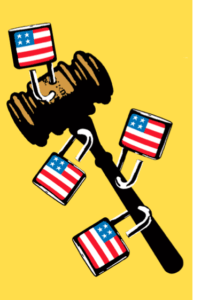 Judge’s & Prosecutor’s Jurisdiction– SCOTUS RULINGS on
Judge’s & Prosecutor’s Jurisdiction– SCOTUS RULINGS on
 Prosecutional Misconduct – SCOTUS Rulings re: Prosecutors
Prosecutional Misconduct – SCOTUS Rulings re: Prosecutors
Please take time to learn new UPCOMING
The PROPOSED Parental Rights Amendment
to the US CONSTITUTION Click Here to visit their site
The proposed Parental Rights Amendment will specifically add parental rights in the text of the U.S. Constitution, protecting these rights for both current and future generations.
The Parental Rights Amendment is currently in the U.S. Senate, and is being introduced in the U.S. House.
God leaves NO CHILD LEFT BEHIND, it’s the child who refuses to return to his Father!
Our Father is always available, never drunk, never lies, never allows any harm to his children… (a perfect father, hence the name God, the creator)
the harm that one may perceive is not harm but an awakening, if you join with him by asking for his help
pray with good intent in your heart, believe like you once believed in Santa! That means NO DOUBT, 100% PURE TRUST in him!
He never lies, He will deliver! God, through Jesus and only him will give you what you need when you need it!
Gospel Mt 11:28-30
Jesus said to the crowds:
“Come to me, all you who labor and are burdened, and I will give you rest. Take my yoke upon you and learn from me, for I am meek and humble of heart; and you will find rest for yourselves. For my yoke is easy, and my burden light.”
Trust God!
He Lives in Those Whom Invite Their Father In
Nothing Formed Against You Shall Prosper !
